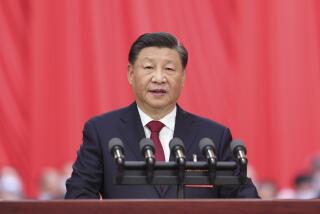Asia in the Shadow of Its Giants
- Share via
HONG KONG — When I last visited this citadel of Chinese culture and capitalist cunning, two months before the British territory’s handover to Beijing, the question on everyone’s mind was whether China would ruin the party. But on the surface at least, the place looks to be its old self. Judges still don those silly British wigs; the traffic is more Manhattan than mandarin; the newspapers remain competitively feisty. The chief executive is able to claim, without serious contradiction, that, so far, Beijing has kept its promise not to interfere. Officials here even point out that before the handover they had far more telephonic back-and-forths with London than they have with Beijing.
Perhaps they now sometimes wish Beijing would call more. For what has Hong Kong on edge these days is not political but economic: the economic storms whirling through Asia. Not even an economy that’s one of the strongest and freest in the world is immune to the turmoil. And Hong Kong’s overseer, China, holds a hole card that could undermine regional recovery. China could, as it did years ago, devalue its currency and flood world markets with the cheapest goods anywhere, thereby frustrating all other Asian economies now relying on exports to dig their way out of their holes. When U.S. Deputy Treasury Secretary Lawrence Summers obtained from China’s economic czar Zhu Rongji last week a loud, public reaffirmation of China’s promise not to devalue, the region cheered. Says the chairman of the Hong Kong Trade Development Council, Victor Fung, “China is taking the responsible route. No devaluation means that Beijing is now willing to share the export market.”
Well, maybe: A prolonged crisis could easily compel even cash-reserve-rich China and Hong Kong to go the way of other Asian economies and cheapen their currencies. Many valued the American team led by Summers for showing up in Beijing to make nice with the Chinese, and for being less nice with bad economic managers like Indonesia’s Gen. Suharto. “Summers stiffened the backbone of Asia’s leaders,” says Donald Tsang, Hong Kong’s financial secretary.
This past week, as I interviewed many concerned Hong Kong officials and business leaders, emotions in this Special Administrative Region of the People’s Republic of China bounced up and down like the Hong Kong stock market. And when the U.S. Congress made more we-don’t-want-to-help noises, Hong Kong’s normally soft-spoken Chief Executive C.H. Tung spoke out: “Today’s turmoil affects not just Hong Kong but will affect the whole world. It is a global problem. The best way to deal with countries [that have made mistakes] is through the International Monetary Fund. The reluctance of some in Congress to support the IMF is unwise. Turmoil in international finance can move in very mysterious ways. Because markets are more open, all of us become more contagious.”
Besides Washington and China, the Asian spotlight is also on Japan. If Tokyo doesn’t jump-start its economy, there may be political as well as economic consequences. In Beijing, with regionally concerned and responsible-looking Chinese officials pointedly at his side, Summers emphasized the need for the Japanese economy to get moving again. Even if China did devalue its currency, Asia might still recover in a few years; but if Japan’s economy worsens and turns further inward, much of Asia would face a prolonged nightmare. As Tsang put it with permissible overstatement: “If Japan sinks, we all sink. That’s the end of the world.” So when it became known last week that President Clinton telephoned Japanese Prime Minister Ryutaro Hashimoto to underscore the urgency of the moment, the nascent anti-Americanism that has been developing in this region was put on hold.
Everyone realizes that the only economy bigger than Japan’s is that of the United States, and the only one who can talk man-to-man with Hashimoto is the American president. It was a momentary epiphany for everyone--especially since Clinton’s call may even have done some good. Afterward, Tokyo announced it was reviewing its domestic economic stimulus package to make sure it was big enough to do the job. The sometimes adroit Clinton needs to stay on the case.
More to Read
Sign up for Essential California
The most important California stories and recommendations in your inbox every morning.
You may occasionally receive promotional content from the Los Angeles Times.










